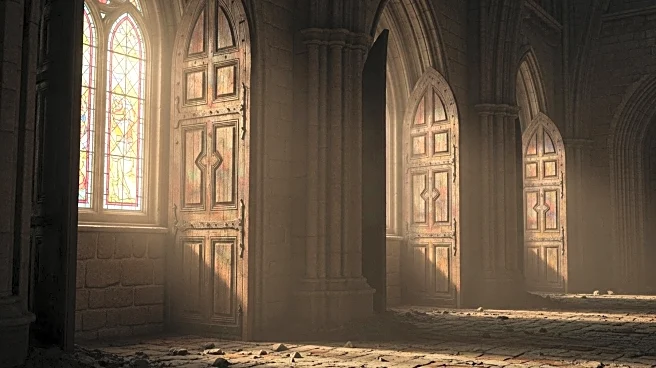What's Happening?
In Gaza City, clergy and nuns from two churches have vowed to remain open and provide shelter to civilians despite an impending Israeli Defense Forces (IDF) offensive. The Greek Orthodox Patriarchate of Jerusalem and the Latin Patriarchate of Jerusalem announced that the Greek Orthodox compound of Saint Porphyrius and the Holy Family compound are serving as refuges for hundreds of civilians, including the elderly, women, and children. These individuals are reportedly weakened and malnourished due to ongoing hardships. The church leadership has stated that leaving Gaza City would be tantamount to a death sentence, prompting their decision to stay and care for those seeking refuge. This decision comes in the wake of Israel's security cabinet approving Prime Minister Benjamin Netanyahu's plan to establish control over the Gaza Strip, starting with an invasion of Gaza City. Residents have been ordered to evacuate by October 7, 2025.
Why It's Important?
The decision by the churches to remain open highlights the humanitarian crisis unfolding in Gaza City amid military operations. The refusal to evacuate underscores the dire situation faced by civilians, who are caught between the threat of military action and the challenges of displacement. This development raises significant concerns about the protection of civilians in conflict zones and the role of religious institutions in providing sanctuary. The churches' stance also reflects broader tensions regarding the displacement of Palestinians and the ongoing conflict between Israel and Hamas. The humanitarian implications are profound, as the churches provide critical shelter and support to vulnerable populations, potentially influencing international perspectives on the conflict.
What's Next?
As the IDF prepares to advance into Gaza City, the churches' decision to remain open may lead to increased scrutiny and pressure from international humanitarian organizations and governments. The situation could prompt calls for diplomatic intervention to ensure the safety of civilians and respect for religious sanctuaries. The Israeli government may face international criticism and demands for accountability, particularly in light of previous incidents involving strikes on religious sites. The churches' actions could also inspire other religious and humanitarian groups to take similar stands, potentially affecting the dynamics of civilian protection in conflict zones.
Beyond the Headlines
The churches' decision to offer shelter despite evacuation orders raises ethical questions about the responsibilities of religious institutions in conflict zones. It highlights the moral dilemmas faced by clergy and humanitarian workers in balancing safety with the duty to protect vulnerable populations. This situation may also influence long-term discussions on the role of religious entities in peacebuilding and conflict resolution, as well as the protection of cultural and religious heritage during military operations.










